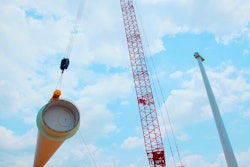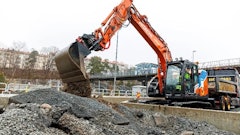Construction spending fell for the sixth straight month in May, touching an 11-year low, as shrinking public outlays and residential construction swamped a rise in private nonresidential work, the Associated General Contractors of America reported in an analysis of new Census Bureau data. The construction trade association’s chief economist, Ken Simonson, predicted spending patterns would continue to be uneven.
“Despite a few bright spots—power, manufacturing, and warehousing and distribution facilities—most construction is stuck in neutral at best or is shrinking,” Simonson says. “Five years removed from the peak in spending and jobs, the industry still faces a long road to recovery.”
Simonson pointed out that public construction spending has skidded 12% in the past eight months as state and local budget cuts have outweighed federal spending on stimulus and military base realignment projects. Meanwhile, the widely reported upturn in private apartment activity has yet to show up in the Census numbers.
Simonson noted that total construction spending declined 0.6% from April to May at a seasonally adjusted annual rate, putting the May rate at $753 billion, down 7.1% from a year ago and down 38% from the record high in March 2006. Private nonresidential spending increased 1.2% from April to May but fell 5.1% compared with the May 2010 level. Private residential spending was off 2.1% for the month and 6.6% year-over-year. Public spending dropped 0.8% and 9.3%, respectively.
The private nonresidential gains were concentrated in power construction—emissions control upgrades to coal-fired plants, renewable power installations, transmission lines, and oil and gas distribution—which jumped 4.4% in May and 11.5% from a year earlier, Simonson observed. Private transportation investments, such as trucking and air freight facilities, rose 4.5% for the month and 3.7% over 12 months. Manufacturing construction climbed 1.8% in May but was down 19.6% since May 2010.
Simonson commented that the largest residential category is currently improvements to existing single- and multifamily properties. These expenditures fell 3.8% for the month and 1.0% year-over-year, he said. New single-family construction sank 0.3% and 11.9% respectively, while new multi-family construction dropped 2.1% and 6.8%.
The two biggest public categories—highways and educational construction, which make up more than half of the public total—both contracted sharply in May, Simonson pointed out. Highway construction fell 1.5% for the month and 11.3% year-over-year, while education spending dropped 2.3% and 8.7%.
“Looking ahead, expect to see continued strength in power, manufacturing and distribution projects, along with a pickup in market-rate apartment construction,” Simonson concludes. “But declining public spending is likely to keep overall gains modest at best.”


















